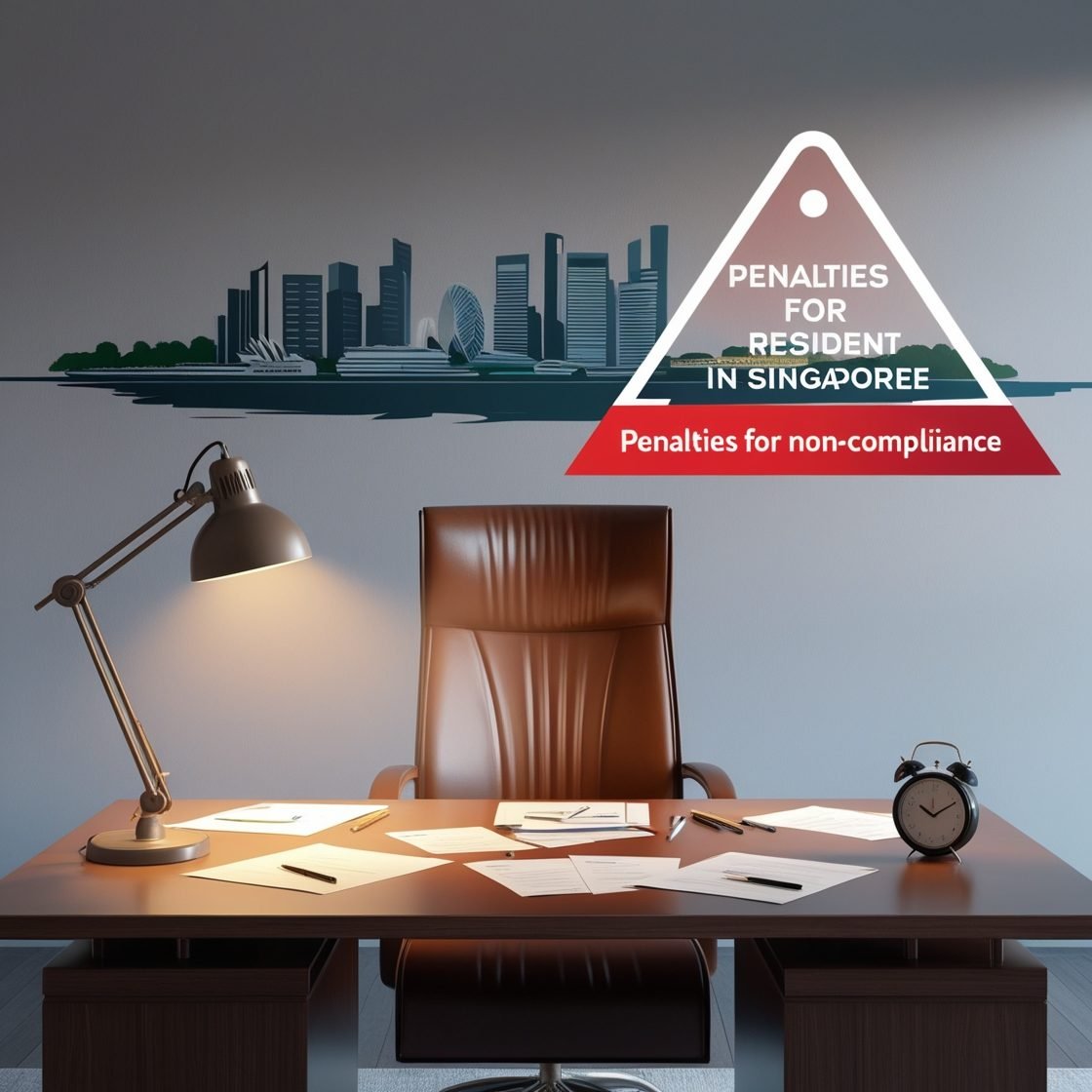Singapore is widely recognized as one of the best places to do business in Asia due to its pro-business environment, strong regulatory framework, and strategic location in Southeast Asia. For companies looking to incorporate in Singapore, there are certain legal requirements that must be followed to ensure compliance with the law. One of the most crucial of these requirements is the appointment of a resident director. This blog post will explain the penalties for failing to appoint a resident director in Singapore and discuss why appointing one is essential for compliance with local regulations.
Understanding the Requirement for a Resident Director
In Singapore, companies are required by law to have at least one resident director. This is stipulated under the Companies Act, which governs corporate operations in the country. A Singapore resident director must be physically present in Singapore and meet specific eligibility criteria. The resident director acts as a representative of the company in all dealings with the Singapore government and plays a significant role in ensuring compliance with local laws and regulations.
What is a Resident Director?
A resident director is an individual who meets the following criteria:
- Singapore citizen, permanent resident, or holds a valid work pass such as an Employment Pass, EntrePass, or Dependant Pass.
- The director must be at least 18 years old and mentally sound, with the capacity to manage the company.
The role of the resident director is essential in making sure that the company adheres to Singapore’s corporate governance standards and regulatory requirements. This includes ensuring that the company complies with tax laws, filing annual returns, and following all other legal requirements.
Also Read: Checklist for Company Limited by Guarantee Formation in Singapore
Why is a Resident Director Necessary?
The presence of a resident director is vital for several key reasons:
Ensuring Compliance with Local Laws and Regulations: A resident director ensures that the company operates in accordance with the Companies Act and other relevant regulations. This includes timely filing of financial statements, holding annual general meetings, and ensuring the business operates ethically.
Facilitating Communication with Government Agencies: A resident director is the designated point of contact for all communications with government bodies such as the Accounting and Corporate Regulatory Authority (ACRA) and Inland Revenue Authority of Singapore (IRAS). This ensures that the company remains in good standing with authorities.
Representing the Company in Legal Matters: In case of any legal proceedings or disputes, the resident director serves as the official representative of the company. They are accountable for ensuring that the company’s corporate actions comply with the law.
Also Read: How to Form Strategic Alliances in Singapore
Penalties for Non-Compliance
Failing to appoint a resident director or neglecting the responsibilities of the role can lead to serious penalties, both financial and legal. The following are the potential consequences for non-compliance:
1. Financial Penalties:
The Accounting and Corporate Regulatory Authority (ACRA) enforces penalties on companies that do not meet the legal requirement of appointing a resident director. These penalties can accumulate quickly, depending on the nature and severity of the non-compliance.
Fines for Non-Compliance: Companies that fail to have a resident director in place may face hefty fines. ACRA may impose daily fines for non-compliance, which can become significant over time.
Late Filing Penalties: In addition to the resident director requirement, companies are required to file annual returns and financial statements with ACRA on time. Delayed filings can result in further fines.
2. Legal Actions:
If a company fails to comply with the legal requirement to appoint a resident director, ACRA has the authority to initiate legal actions. These can include:
Legal Proceedings: ACRA may file lawsuits or take other legal actions against both the company and its directors.
Criminal Charges: In cases of serious breaches, criminal charges may be brought against the company and its directors. Non-compliance could lead to prosecution and severe consequences.
Also Read: Benefits of Company Incorporation in the Philippines
3. Reputational Damage:
Failure to comply with the resident director requirement can result in significant reputational damage to the company. The impact of this damage can be long-lasting and detrimental to business operations.
Loss of Trust: Potential partners, investors, and clients are likely to lose trust in a company that does not adhere to local regulations.
Difficulty in Securing Financing: Investors and financial institutions may be hesitant to engage with a business that has failed to meet regulatory requirements, making it difficult to raise capital or secure loans.
4. Operational Disruptions:
Without a resident director, the company may face operational disruptions that affect its ability to run efficiently:
Delays in Obtaining Licenses and Permits: Without a resident director, the company may struggle to obtain necessary licenses or permits for operations, delaying its ability to function effectively.
Issues with Bank Accounts: Banks in Singapore typically require a resident director to open a corporate bank account. Without one, the company may face difficulties conducting essential financial transactions.
5. Loss of Business Opportunities:
Non-compliance with the resident director requirement can also lead to missed opportunities:
Missed Partnerships: Companies that are not in compliance with local regulations may miss out on key partnerships, collaborations, or investment opportunities.
Hindered Growth Potential: The inability to gain trust or secure financing may stunt the company’s growth, leading to fewer business opportunities.
Also Read: Documents Required in Private Limited Company Formation in Singapore
Best Practices for Ensuring Compliance
To avoid the penalties and operational setbacks associated with failing to appoint a resident director, businesses should adopt best practices for compliance.
1. Appointing a Suitable Resident Director:
It is critical to appoint a qualified and experienced resident director. Factors to consider include:
- Industry knowledge and expertise in local regulations.
- A strong understanding of corporate governance.
- The ability to manage the legal and financial responsibilities associated with the role.
2. Effective Communication:
Ensure open and regular communication with the resident director. Keeping them informed about company developments and business activities helps ensure that the company stays compliant with Singapore’s legal requirements.
3. Compliance with ACRA Regulations:
Timely filing of annual returns and financial statements with ACRA is critical to avoiding penalties. Adhering to corporate governance standards is also essential to maintaining good standing.
Also Read: Procedure of the Registration of Shelf Company in Singapore
Conclusion
Appointing a resident director is not just a legal requirement in Singapore; it is a key aspect of maintaining compliance with the Companies Act and ensuring smooth business operations. The penalties for failing to meet this requirement can be severe, ranging from financial fines to legal consequences and reputational damage. By appointing a suitable resident director and adhering to Singapore’s corporate governance standards, businesses can avoid these penalties, ensure operational efficiency, and position themselves for growth in one of the world’s most dynamic markets.

























































































































































































































































































































































































































